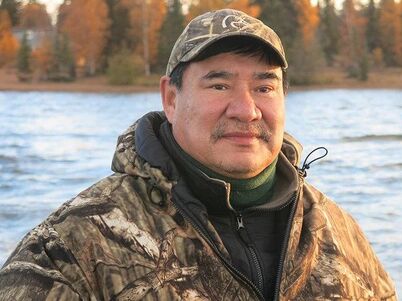|
This is part of a series of profiles about the staff, leaders, and community members who are hard at work implementing Łutsël K’é Dene First Nation's vision for the Thaidene Nëné Indigenous Protected Area. You can read the other profiles here.  James Marlowe is a jack of all trades. His resume includes, among other things, wildlife monitor, broadcaster, land claim negotiator, mine safety, council member, translator/interpreter, and businessman. As of August 2019, James can add tour operator to his resume. His new outfit, Rivers East Arm Tours, offers visitors the opportunity to experience Thaidene Nëné and others parts of the East Arm of Tu Nedhé (Great Slave Lake). Through Rivers East Arm Tours, James also hosts cultural camps for children and youth in his community. Regardless of who he is on the land with, James is committed to sharing Dënesųłıné language and culture. The son of Madeline and Johnny Marlowe, James was born and raised in Łutsël K’é, though he has lived away from the community at points, including to attend Sir John Franklin High School in Yellowknife and Trent University in Peterborough, ON. His early experiences living and learning on the land have kept him grounded in Dënesųłıné language and traditions throughout his life: “I learned to be on the land at a young age. I went out with my family, but also friends. I learned how to fix rabbits and fish, I learned how to process caribou, moose, and other animals by watching the elders.” James was a member of the Thaidene Nëné Advisory Committee from its inception until the signing of the establishment agreements in 2019. In that capacity, he provided direction and advice to the negotiating team as they worked to protect the Land of the Ancestors. James continues to be an advocate for Thaidene Nëné as a member of Xá Dá Yáłtı. Thaidene Nëné Xá Dá Yáłtı, which means those who speak for Thaidene Nëné in Dënesųłıné, is the management board for the Indigenous protected area. For James, designating Thaidene Nëné an Indigenous protected area promises “the protection of our way of life, culture, and traditions, as well as the protection of the land, water, fish, animals, and birds for ourselves, but also for the future. And for those yet unborn.” Equally important is the economic potential presented by establishing an Indigenous protected area that also includes a national park reserve, including more jobs, training, and business opportunities for residents of Łutsël K’é. Lastly, James hopes Thaidene Nëné will create the conditions to share the Dënesųłıné culture and way of life with people from around the world. While all of Thaidene Nëné is special for James, he is particularly fond of Ɂedacho Kúe (Artillery Lake) because it is rich with wildlife. He also loves the sacred areas of Betsı̨ı̨ghıé (Utsingi Point) and Ts’ąkuı Theda (Lady of the Falls). Speaking about Ts’ąkuı Theda, James says, “I believe that she exists, that she helps people when you believe in her, that she heals people. There is strong evidence of our ancestors being helped in the past.” Protecting Thaidene Nëné, the heart of the Łutsël K’é Dene’s ancestral territory, also means protecting sacred sites like Ts’ąkuı Theda and ensuring the old lady will help the people of Łutsël K’é forever. Comments are closed.
|
AuthorWrite something about yourself. No need to be fancy, just an overview. Archives
July 2024
Categories |
CONNECT |
VISIONWe are the Lutsel K’e Dene First Nation. Our vision for Thaidene Nëné is:
Nuwe néné, nuwe ch'anıé yunedhé xa (Our land, our culture for the future). We’re working with our partners to permanently protect Thaidene Nëné—part of our huge and bountiful homeland around and beyond the East Arm of Tu Nedhé. |
